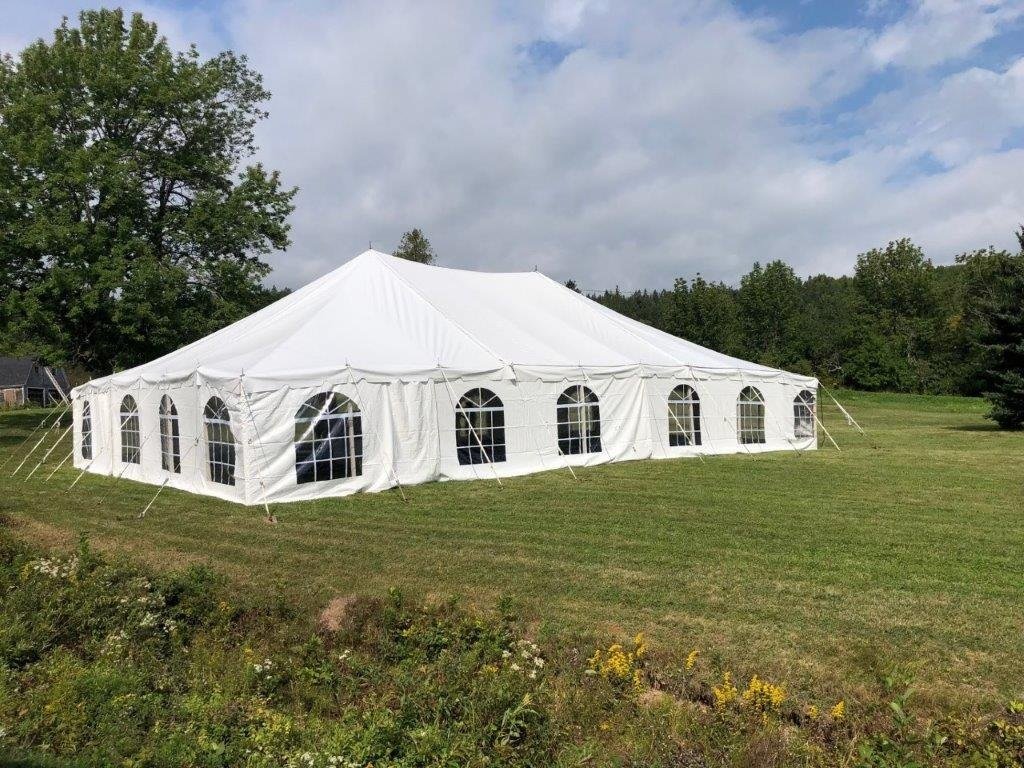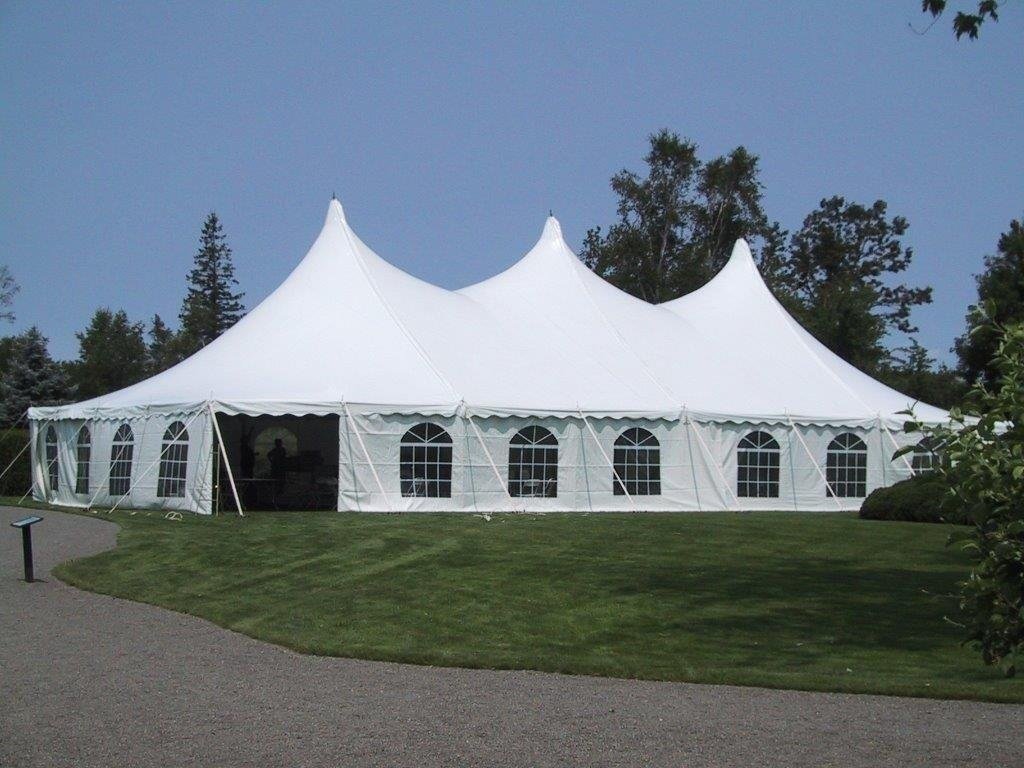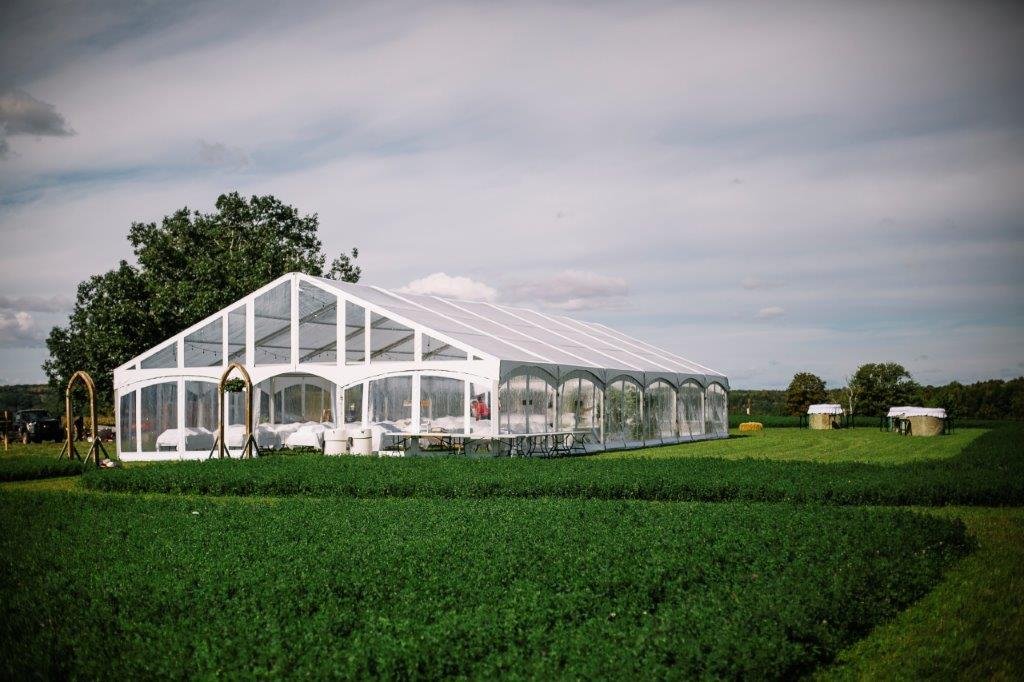So, you want a tented wedding?
Living on the East coast of Canada means having access to amazing ocean views. In Nova Scotia, you are never more than 60 kilometres from the ocean. With 13,300 kilometres of stunning coastline, it’s no wonder that outdoor tented weddings are so popular here. If you are lucky enough to have access to a property with ocean views, or if you just want an intimate wedding in your backyard, I’ll be going over all the considerations you need to think about when contemplating a tented wedding.
I sat down to chat with Allen McCandless of Commercial Tent Rentals. Commercial Tents is based in Sussex, New Brunswick, but they service all of the Atlantic Provinces as well as the U.S. Commercial Tent has been in business since 1985, and along the way have refined their processes over the years. Their strength lies in travelling to jobs. Their systems are set up to execute the job quickly and efficiently once on site.
Types of Tents
Commercial Tent Rentals has three basic styles of tents you can rent.
A Conventional Pole Tent is the most basic tent structure you can rent. It will do the job in terms of creating a sheltered space to host your dinner and dance but it can have a few drawbacks.
It has 2-3 poles down the centre of the tent so the placement of the guest tables, head table and dance floor will have to avoid those poles.
If you are in an area that can get very high winds, a conventional pole tent isn’t the best option, as it isn’t the most sturdy.
All tents and structures have the option of solid white walls, clear walls French window walls or a mixture of each.
A High Peak Tension Tent is similar to the Conventional Pole Tent but the look of it is more elegant, as the roof line is higher and pulled tighter.
This tent also has poles down the centre so placement of the tables, chairs and dance floor is limited.
It is not as sturdy a structure if you are in an area prone to high winds
All tents and structures have the option of solid white walls, clear walls French window walls or a mixture of each.
A Structure Tent like the Clear Span Structure Tent pictured below, is the most sturdy and flexible when it comes to customization.
Structure tents have no centre poles, thereby making set up of the tent interior super easy and flexible.
They are built in such a way that the wall and roof panels slide into tracks, making them far more sturdy in high winds.
You can easily customize your tent by adding doors, hanging chandeliers, speakers and lighting truss from the ceiling.
One drawback to these types of clear tents is that they can get extremely hot on a summer day and basically turn into a greenhouse, which can make setting up challenging for your vendors! Air conditioning may be required for a hot summer day.
Site Requirements
Access to the site and vehicle required. Setting up a tent requires large vehicles. McCandless says a good rule of thumb is to make sure a vehicle the size of a school bus can get within 100 feet of the tent site. Let’s say you are looking at a property whereby the lawn is pretty flat and open, but the driveway is steep and overgrown with trees. This may result in using a different vehicle to get the tent to the site.
The type of tent structure you are setting up will also come with it’s own challenges. A basic, conventional pole tent (first photo, far left, above) can fit in one of their regular trucks without the need of any specialized equipment.
However, if you are looking to have a one of their arch top clear span structure tents, that gets a bit more complicated. Structure tents mean they are switching the vehicle to a tractor trailer to accommodate the 28 foot long rafters. It also means a forklift has to be brought to move everything off the tractor trailer and to the tent location.
Type of ground. Tents can be set up on varying types of ground including grassy lawns, asphalt, or interlocking bricks. It should go without saying, the more level the ground, the better for setting up a tent. However, Commercial Tents are able to install flooring and create a level floor for the tent if needed and the budget allows for that. Typically, the tents are secured with 3-foot long metal spikes that are driven into the ground. However, If you are looking to install a tent on a tennis court for example and don’t want the surface damaged, the tent can be secured with concrete blocks. You also should have a good sense of where any underground pipes or gas lines are so they are avoided when staking the tent.
Proximity to power, washrooms and catering prep area. When thinking about using a tent for your wedding reception, you should also be considering where the power supply will be coming from to plug in lighting for the tent, possible heaters or A/C units and anything the caterers may need power for. You don’t want to be running cables all over the lawn which may become tripping hazards as night falls. The DJ or band will also require power and you may need to add a generator or two for those vendors.
Most tented weddings also rent portable washrooms or washroom trailers. The location and placement of these should also be factored in when thinking about a tented wedding. The same goes for where the caterers will be preparing the food. Will it be inside the house or cottage? Can they use a garage? Or do they need a separate prep tent with power and lighting?
A good exercise is to imagine it is pouring rain on your wedding day. How far would guests need to walk to go to the washroom and how far would caterers need to walk to get food inside the tent. They could potentially need a covered walkway, or some other solution.
Weather safe. The location of a tent is a big factor in how they set up a tent. If the site is in a very windy location, they will take that into consideration. This may mean they orient the tent differently and they triple stake everything in the ground. They have done many structural engineering studies to understand how to set it up to withstand 60 - 70 km/hour winds. They have never had a tent blow away, which is a great thing!
Budget
Okay, let’s get down to the question everyone wants answered - How much will a tented wedding cost me? McCandless says to budget about $30-$40 per person for a basic conventional pole tent with tables and chairs, and small dance floor. In order for this kind of tent set up to be worthwhile for Commercial Tents to service in Nova Scotia, you would need to have a tent for about 100 guests or a minimum of $5000.
If you are looking at a structure tent with a full floor, clear roof and air conditioning your budget will be a lot higher. Clients have spent anywhere from $10,000 to $120,000 on these more elaborate tents.
What to expect when working with Commercial Tent Rentals?
If you have the ideal site and a healthy budget to make your dream wedding vision come true, then the first thing would be to chat with the team at Commercial Tents and book a site visit. If they can’t actually get to the property, they will request photos, a video call walking them through the site and they could even check out Google satellite imagery to get a good sense of the area.
Every tent structure in Nova Scotia requires a fire permit. Commercial Tents can take care of this for you for a fee, or show you what you need to do to get the permit yourself.
Any add-on rentals such as tables, chairs, heaters, air conditioners, etc. would also be discussed and added to your quote as needed.
Tents typically get set up on a Tuesday or Wednesday for a Saturday wedding. They usually come back on the Monday for tear down, so expect almost a week of a tent being on the property.
They have five crews that service the Maritimes and they leave at 6:00 am everyday from Sussex, New Brunswick. That means if they are heading to Halifax a crew can be there by 9:30 am. Most regular pole tents are set up in a day. The more elaborate structure tents can take anywhere from 3-5 days to set up, and sometimes they need a full week.
I hope that gives you a really good overview on what to expect when looking at a tented wedding! Be sure to sign up for my newsletter to be notified about future blog posts and other useful stuff. I will be continuing this series on wedding vendors, so more to come!



